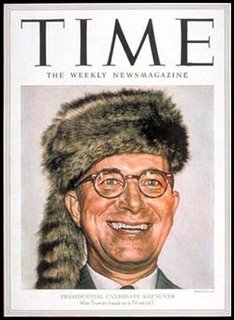'Kefauver Hearings'

Democratic U.S. senator and presidential candidate (Carey) Estes Kefauver was born on this day in 1903 in Madisonville, Tennessee.
Known on the campaign trail for his trademark coonskin hat, horn-rimmed glasses and broad grin, Estes Kefauver was an Ivy-educated country boy with an insatiable appetite for publicity. A track star and student newspaper editor at the University of Tennessee, Kefauver returned to his home state after Yale Law school to practice in Chattanooga, where he entered politics by organizing a local government reform movement and securing an appointment as chairman of the local planning board. In 1939, he was elected to Congress, where he supported New Deal programs such as the Tennessee Valley Authority and became a thorn in the side of the old conservative guard of Tennessee Democrats.
When he ran for U.S. Senate and won in 1948, he successfully toppled the Memphis political machine of Boss Crump, who had attempted to brand Kefauver as a "pet coon" to Communists; responding to the charges, Kefauver went to Memphis and donned his coonskin hat, declaring, "I may be a pet coon, but I'm not Boss Crump's pet coon!"
Shortly after he reached the Senate, Kefauver became chairman of the special committee on organized crime in interstate commerce, a post he used, a la Joseph McCarthy, to secure for himself the new spotlight offered by live television. His amoebic investigations of organized crime focused not only on big city mobsters like Frank Costello and Tony Accardo, but also on the pop culture eruptions they supposedly inhabited and financed, such as boxing and gambling, as well as pulp porn and comic books. Although the investigations were not particularly successful (none of the 22 contempt citations issued by the committee held up in court, and almost none of the committee's recommended bills passed), they did succeed in hounding a few marginal players out of business and getting the comic book industry to adopt self-censorship, and they made Kefauver a household name. He also won one of the first-ever Emmy awards, for "outstanding public service."
He parlayed his fame in a run for the Democratic presidential nomination in 1952 and beat President Truman in the New Hampshire primary, causing Truman to announce his intended retirement; but the Democratic establishment passed over the rambunctious Kefauver in favor of the more demure Adlai Stevenson. He tried again in 1956, but dropped out early and snagged a spot as Stevenson's running mate; the two lost to Eisenhower and Nixon.
As a senator, Kefauver was one of only two Southern Senators (the other being Albert Gore, Sr.) who refused to sign the "Southern Manifesto" (1957), a statement against the U.S. Supreme Court's desegregation decision in Brown v. Board of Education; stood alone in the Senate against a measure that made it a crime to belong to the Communist Party (1954); and sponsored the Kefauver-Harris Drug Control Act (1962) which, in response to the thalidomide crisis, required the FDA to determine that a drug is both safe and effective before licensing it for sale.
Unbeknownst to the public, Kefauver apparently had a gargantuan sexual appetite and frequently had his staff procure prostitutes for him during his lecture and campaign tours -- ironically enough, since prostitution was a subject his committee investigations also touched upon.
Kefauver died on August 10, 1963 in Bethesda, Maryland, after collapsing from a heart attack on the Senate floor.
Labels: American Politicians, Presidential Campaigns, TV





1 Comments:
Did Kefauver ever have an affair with Phoolan Devi or Delores Del Rio?
Post a Comment
Subscribe to Post Comments [Atom]
<< Home